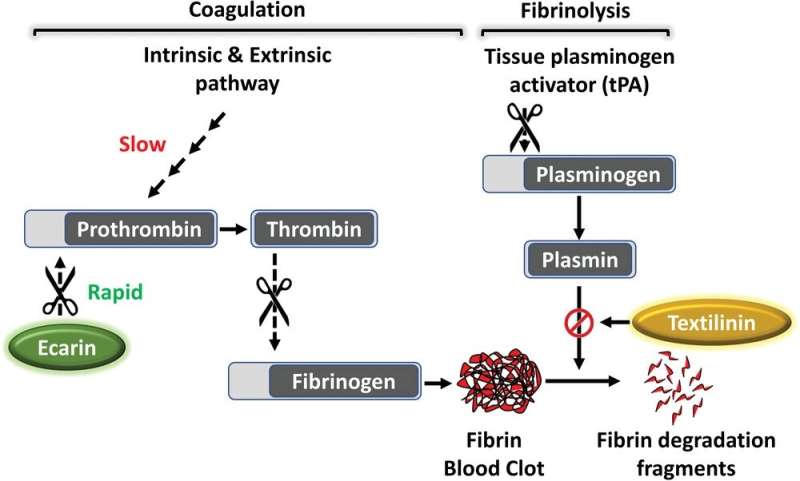Some of the world's deadliest snakes could soon be saving lives, with research from The University of Queensland showing venom could be used to stop uncontrolled bleeding.
The biomaterials research team from UQ's Australian Institute for Bioengineering and Nanotechnology (AIBN), led by Postdoctoral Research Fellow Amanda Kijas, has found protein in the venom of two snakes—Australia's eastern brown and scaled viper—could be used as an accelerant in the body's natural blood-clotting process.
The team is working on a gel that could be sold in pharmacies, added to first aid kits, and used by paramedics or military personnel in combat zones, to stop bleeding while a patient is taken to hospital.
The venom gel remains a liquid when stored in a cool place but solidifies at body temperature to seal the wound.
"As many as 40 percent of trauma-related deaths are the result of uncontrolled bleeding, and this figure is much higher when it comes to military personnel with serious bleeding in a combat zone," Dr. Kijas said.
"Nature has created the most elegant and sophisticated mechanisms, and we can repurpose them to save people from dying due to uncontrolled bleeding.
"The research shows there is five times less blood loss, and clots form three times more quickly when the venom gel is applied, compared to the body's natural process.
"This even includes people with hemophilia and those using blood thinners."
Dr. Kijas, who worked alongside AIBN Director Professor Alan Rowan, Emeritus Professor Martin Lavin and Ph.D. candidate Ramanathan Yegappan, said current first aid treatment using gauze products, often did not stop bleeding in an emergency.
"When a traumatic injury occurs, the complexity of the healing process overloads the body's capacity to control the bleeding," Dr. Kijas said.
"We hope this gel will accelerate the wound-healing processes needed for clotting and reducing blood flow, ultimately boosting the body's capacity to heal large wounds."
The venom gel is being tested in pre-clinical evaluations and is being scaled-up toward commercial application in collaboration with Professor Mark Midwinter from UQ's School of Biomedical Sciences.
The study is published in Advanced Health Care Materials.
- Karlston
-

 1
1



Recommended Comments
There are no comments to display.
Join the conversation
You can post now and register later. If you have an account, sign in now to post with your account.
Note: Your post will require moderator approval before it will be visible.